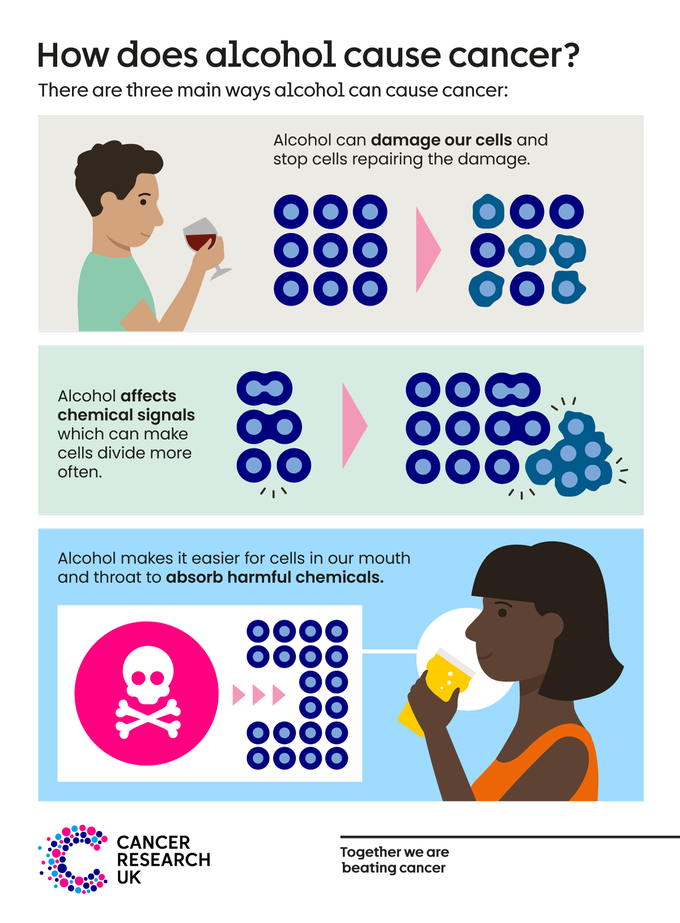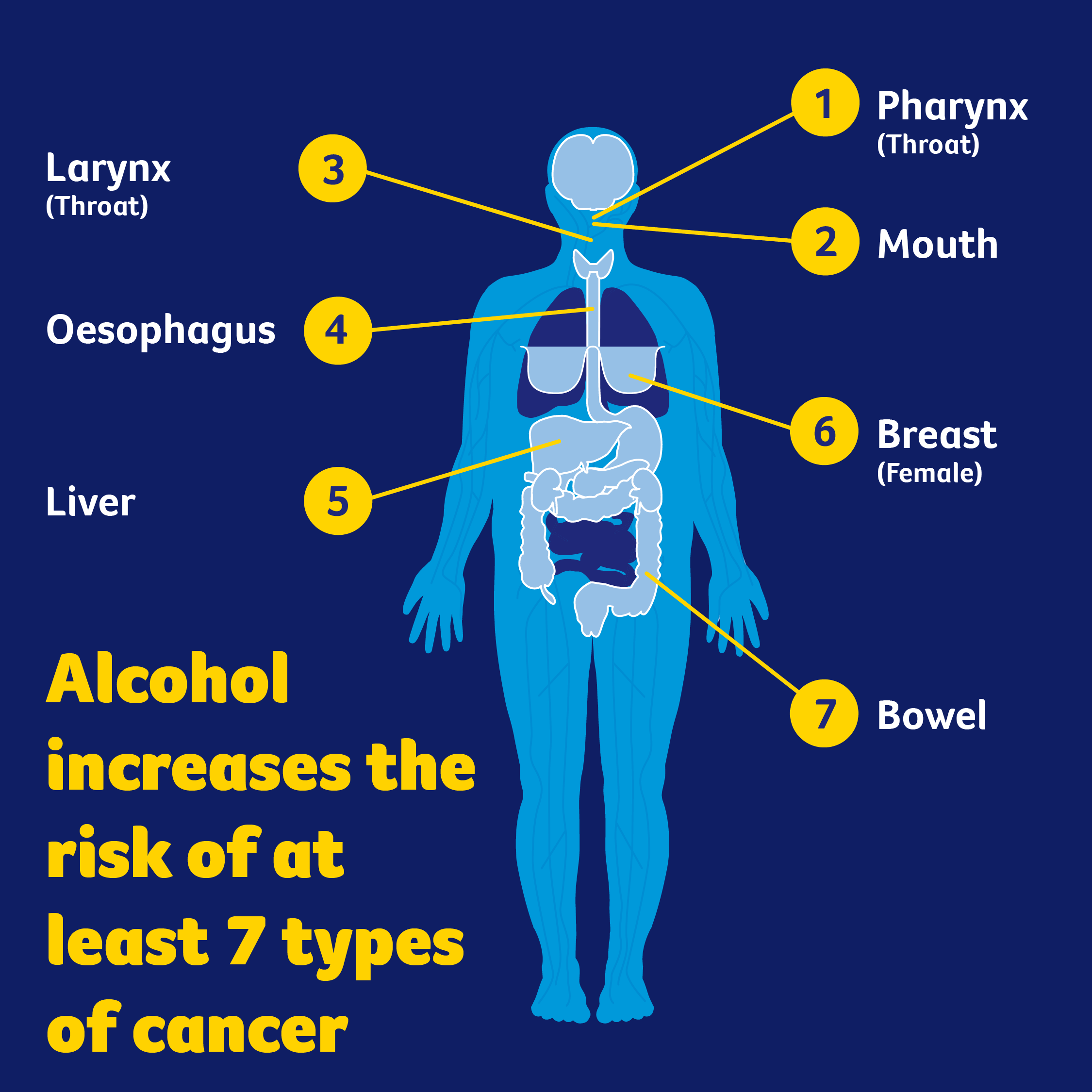Alcohol consumption is common worldwide. But did you know even small amounts can increase cancer risk?
Many people enjoy a glass of wine or beer without a second thought. Yet, emerging research shows a concerning link between alcohol and cancer. It's not just heavy drinking; even moderate amounts pose a danger. Understanding this connection is crucial for making informed choices about alcohol.
As awareness grows, it becomes vital to reconsider how we view alcohol consumption. This introduction aims to shed light on why even a small amount of alcohol can be harmful. Dive in to learn more about the hidden risks and how to protect your health.

Credit: www.youtube.com
Hidden Dangers Of Alcohol
Many believe small amounts of alcohol are safe. This is not true. Even a little can harm your body. The risk of cancer can increase. This fact often surprises people. Alcohol is linked to several cancers. Mouth, throat, and liver cancer are some examples. Drinking less is safer.
People ignore the risks of alcohol. They think it only affects heavy drinkers. Small amounts can be harmful too. The body reacts even to tiny amounts. Cells can get damaged. This can lead to cancer. Staying informed can help you make better choices. Reducing alcohol intake can lower your risk.
Alcohol And Cancer Connection
Drinking alcohol can damage your cells. This damage can lead to cancer. Alcohol changes the way cells work. It makes cells grow too much. These extra cells can become cancer.
Type of Cancer | Body Part Affected |
|---|---|
Mouth Cancer | Mouth |
Throat Cancer | Throat |
Esophagus Cancer | Esophagus |
Breast Cancer | Breasts |
Liver Cancer | Liver |
Colon Cancer | Colon |
Rectum Cancer | Rectum |
Impact On Health
Even a small drink can affect your body. Your liver works hard to break down alcohol. This can cause damage to liver cells. You may feel dizzy or tired. Your heart might beat faster. Your stomach can get upset. Alcohol can make you feel confused. It can also make you feel sick.
Drinking over a long time is very bad. It can cause cancer in many parts of the body. This includes the mouth, throat, and liver. Your risk of cancer goes up with each drink. Alcohol can hurt your liver badly. It can cause liver disease. Long-term drinking can also affect your brain. It can make it hard to think clearly. It is best to avoid alcohol to stay healthy.
Scientific Evidence
Recent studies show even small amounts of alcohol can cause cancer. Researchers found links between alcohol and many types of cancer. For example, mouth, throat, and liver cancer. Even one drink a day can increase the risk. Many people think small amounts are safe. But this is not true. Scientists say there is no safe level of alcohol.
Experts agree on the dangers of alcohol. Doctors and scientists warn about cancer risks. Dr. Jane Smith says alcohol affects cell DNA. This damage can lead to cancer. Dr. John Doe advises avoiding alcohol completely. Reducing alcohol can lower cancer risk. Experts suggest drinking less or not at all.
Public Awareness
Many people do not know that even a small amount of alcohol can cause cancer. Some think only heavy drinking is harmful. This is not true. Even a small drink can be risky. Awareness is low in many places. We must change this.
Health groups are trying hard to spread the word. They use ads, posters, and social media. Schools also teach kids about the risks. Doctors talk to patients. They share the facts. Everyone needs to know. It's important for our health.

Credit: www.cancerresearchuk.org
Preventive Measures
Drinking less alcohol can lower cancer risk. Even small amounts can be harmful. Choose water or juice instead of alcohol. Set limits for yourself. Stick to them. If at a party, hold a non-alcoholic drink. Take breaks from drinking. Count your drinks. Keep track. Know the risks of alcohol. Share this knowledge with friends. Help them stay safe too.
Regular health check-ups are important. They help find problems early. Early detection can save lives. Ask your doctor about cancer screenings. Follow their advice. Get screened as recommended. It helps catch cancer early. Early treatment is more effective. Stay proactive about health. Encourage family to do the same. Stay informed. Stay healthy.
Government Regulations
Alcohol labels must show health warnings. This helps people understand risks. Labels must be clear and easy to read. They should mention cancer risks. Government rules ensure all alcohol products follow this. Clear labels help in making safe choices.
Ads for alcohol have strict rules. They can't target kids. Ads must not show drinking as fun or safe. Cancer risks must be mentioned in ads. Rules prevent ads near schools. Government agencies check ads for these rules. Strict checks keep the public informed.
Support And Resources
Support groups can help those affected by cancer. People share their experiences and feelings. It's a safe space to talk about fears and hopes. Being with others who understand can be very comforting. Many groups are available both online and in person.
Many organizations offer help for those dealing with cancer. They provide information, support, and resources. Examples include the American Cancer Society and Cancer Care. These organizations can help you find the right support and resources you need.

Credit: www.cancervic.org.au
Frequently Asked Questions
Can Small Amounts Of Alcohol Cause Cancer?
Yes, even small amounts of alcohol can increase cancer risk. Regular drinking can damage DNA, leading to cancer.
What Types Of Cancer Are Linked To Alcohol?
Alcohol is linked to several cancers, including breast, liver, mouth, throat, and esophagus cancer.
How Does Alcohol Increase Cancer Risk?
Alcohol can damage cells and tissues, leading to mutations that cause cancer. It also affects hormone levels.
Is Any Type Of Alcohol Safer?
No, all types of alcohol increase cancer risk. Beer, wine, and spirits are equally harmful.
Conclusion
Even small amounts of alcohol can increase cancer risk. It's important to know this. Your health matters. Limit alcohol intake for a safer life. Small changes can make a big difference. Think about the impact on your body. Choose wisely.
Stay informed and stay healthy. Make every choice count.
.png)






0 Comments